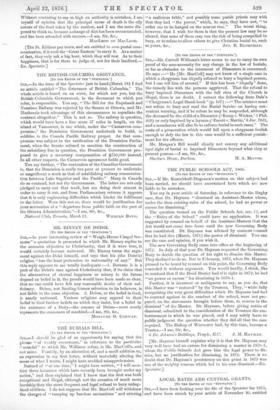THE PUBLIC SCHOOLS ACT, 1868:
[TO THE EDITOR OF THE "SPECTATOR."]
SIR, —If Mr. Knatchbull-Hugessen's motion on this subject had been carried, we should have ascertained facts which are now liable to be mistaken.
You say in your article of Saturday, in reference to the Rugby case, that Dr. Hayman " dismissed an Assistant-Master whom, under the then existing rules of the school, he had no power or excuse for dismissing."
The question turned on the Public Schools Act, sec. 13, and the "Rules of the School" could have no application. It was suggested by counsel on behalf of the Assistant-Masters that the Act would not come into force until the new Governing Body was constituted. Dr. Hayman was advised by eminent counsel that he had then (March, 1871) the power of dismissal. You can see the case and opinion, if you wish it.
The new Governing Body came into office at the beginning of 1872. In July of that year Dr. Hayman requested the Governing Body to decide the question of his right to dismiss this Master. They declined to do so. But in February, 1873, when Dr. Hayman pressed to be heard by counsel on this point, the Governing Body conceded it without argument. You would hardly, I think, like to contend that if the Head Master bad tl•is right in 1872, he had "no power or excuse" for dismissing in 1870-1.
Further, it is incorrect or ambiguous to say, as you do, that this Master was " restored " by the Trustees. They, "while fully recognising the very great difficulties which Dr. Hayman had had to contend against in the conduct of the school, were not pre- pared, on the statements brought before them, to concur in the dismissal " of the Master. Dr. Hayman, before giving notice of dismissal, submitted to the consideration of the Trustees the em- barrassment in which he was placed, and I may safely leave to public judgment the question whether they did all that the case required. The Bishop of Worcester had, by this time, become a Trustee.—I am, Sir, &c.,
3 Dr. Johnson's Buildings, Temple, B.C. J. M. IlAysis.s.
[Mr. Hayman himself explains why it is that Dr. Hayman may very well have had no excuse for dismissing a master in 1870-1, whom the Public Schools Act gave him the legal power to dis- miss, but no justification for dismissing, in 1872. There is no doubt that Dr. Hayman's persistency on this point in 1873 was one of the weighty reasons which led to his own dismissal—En. Spectator.]






























 Previous page
Previous page